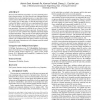Free Online Productivity Tools
i2Speak
i2Symbol
i2OCR
iTex2Img
iWeb2Print
iWeb2Shot
i2Type
iPdf2Split
iPdf2Merge
i2Bopomofo
i2Arabic
i2Style
i2Image
i2PDF
iLatex2Rtf
Sci2ools
105
click to vote
SOSP
2005
ACM
2005
ACM
The taser intrusion recovery system
Recovery from intrusions is typically a very time-consuming operation in current systems. At a time when the cost of human resources dominates the cost of computing resources, we argue that next generation systems should be built with automated intrusion recovery as a primary goal. In this paper, we describe the design of Taser, a system that helps in selectively recovering legitimate file-system data after an attack or local damage occurs. Taser reverts tainted, i.e. attack-dependent, file-system operations but preserves legitimate operations. This process is difficult for two reasons. First, the set of tainted operations is not known precisely. Second, the recovery process can cause conflicts when legitimate operations depend on tainted operations. Taser provides several analysis policies that aid in determining the set of tainted operations. To handle conflicts, Taser uses automated resolution policies that isolate the tainted operations. Our evaluation shows that Taser is eff...
Intrusion Recovery | Local Damage Occurs | Operating System | Preserves Legitimate Operations | SOSP 2005 |
Related Content
| Added | 17 Mar 2010 |
| Updated | 17 Mar 2010 |
| Type | Conference |
| Year | 2005 |
| Where | SOSP |
| Authors | Ashvin Goel, Kenneth Po, Kamran Farhadi, Zheng Li, Eyal de Lara |
Comments (0)

